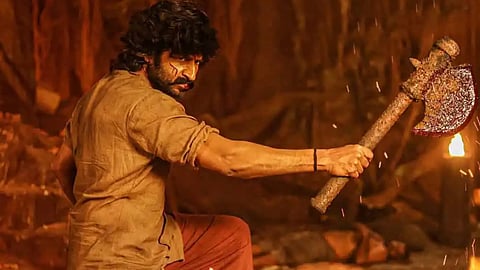Bhimaa Movie Review: A middling attempt at the hero worship-meets-mythology trope
A middling attempt at the hero worship-meets-mythology trope(2.5 / 5)
Hero worship is a unique beast for Indian cinema. For years, our mainstream industries have thrived on it, but in the last few years, it seems like most movie moguls have run out of ideas on how to keep feeding the beast. A simple superhuman does not suffice anymore; a Hero must now reach the level of godliness. The situation is so dire that some filmmakers have blatantly begun to make films about religious figures themselves (but that’s a separate genre and a separate discussion altogether). For those who still want to indulge in hero worship without invoking religion, these are challenging times. One hero is not enough; we need an alter ego sometimes, a doppelganger at others. The hunger for larger-than-life heroism is growing and is insatiable. These insecurities are all the more apparent in the latest Gopichand starrer Bhimaa.
Bhimaa unfolds in a small town named Mahendragiri that is riddled with smuggling activities, courtesy of an ageing yet menacing overlord Bhawani (Mukesh Tiwari), and his ruthless associate Rudra (Cheluvaraj). Things take a turn, and lawlessness sees a gradual decline after a daredevil cop named Bhimaa (Gopichand) arrives in the town. However, when Bhimaa’s valour and sincerity put his own life at stake, times call for someone unexpected to come to his rescue and to reinstate a sense of justice in Mahendragiri.
For the first half hour or so, Bhimaa follows every trick in the playbook of a standard action-comedy. You can predict every moment and every scene with a mood switch from a mile away, it’s part of the appeal. Something so familiar that you can watch with half your attention and still be amused. There is also a distasteful romance subplot, with the hero attempting to woo the heroine (Malvika Sharma) on the pretext of fake acid attack threats from someone, not to mention the blatant objectification in almost every scene she is part of. It’s almost like no mass movie is complete without its share of misogyny. Not even Gopichand's great comedic timing and easy-going screen presence could save the cringe-inducing portions.
For a film that rides so heavily on these high-testosterone action sequences, director A Harsha fails to bring any sense of novel energy to its action sequences. We get a sense of 'been there, done that' as one generic action sequence after another roll by.
Bhimaa only gets interesting in the second half (despite its share of dull moments and haphazard pacing), after a major reveal around the interval mark. While we expect the director to amp up the heroism, he surprisingly takes the story to a relatively quieter space, which not only works as a breather from the hyperbolic action sequences but also brings a sense of melodrama to this otherwise campy universe. This narrative choice also makes it easier for the audience to digest the mythology-meets-fantasy route we know the film is eventually bound to take. Of course, this segment too contains many moments of juvenile humour, but they don’t irk you to the point of disconnect.
The film almost redeems itself with a rousing and convincingly staged final act that blends camp, fantasy, and the supernatural. Everyone from Gopichand to Priya Bhavani Shankar and Harsha joins hands as they hard sell the sequence, and thankfully it lands on its feet. This stretch also contains the most enjoyable moments of the movie as we watch the veteran Nassar revel in a certain theatricality that a movie antagonist of this kind thrives in. All the restrained energy of the second half erupts into a full blast here, and that’s what mass cinema is all about. Even for the contemporary audience and their short attention spans, a film doesn't have to limit itself to a series of adrenaline-pumping moments. A film needs to have its lows in order to make the highs work. So what if here, the director himself doesn’t abide by the rule through all of its runtime?
Bhimaa is dull in places, predictable for most parts, and barely original. Yet, it has its share of moments that make the theatre visit worth your while.

